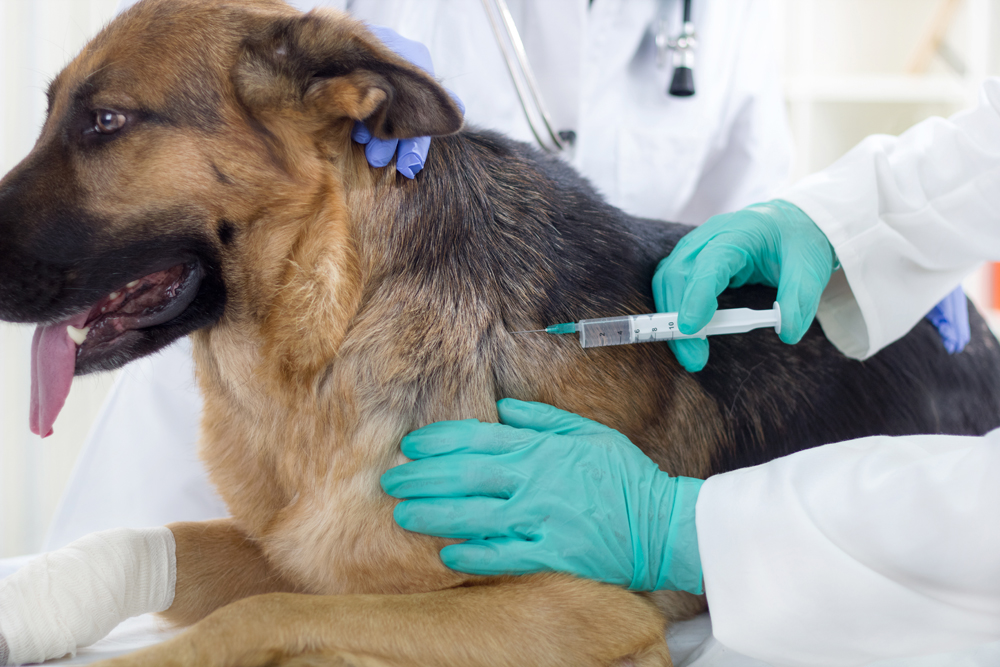There are many deadly viruses that dogs and cats can get. It’s a lot cheaper and a lot less heartbreaking to go ahead and get their shots. We have many resources in our area to help with that. In Alabama, only a licensed veterinarian can give a rabies vaccine, and it is the law that your pet has one. This virus is the only one that can be transmitted from animal to person. It is always deadly if untreated.
Parvo is the most well-known virus in dogs. Vets see far more cases a year of parvo than any other virus. If caught early it can be treated, and your pet may survive. The virus has a very distinctive smell. Symptoms include vomiting, bloody diarrhea, fatigue, loss of appetite and severe weight loss. It is said that parvo can live in the ground for up to a year. You can carry it on your clothes and shoes.
Canine distemper is a viral disease that affects a wide variety of animal families, including domestic and wild species of dogs. Symptoms include Fever, Clear nasal discharge, eye discharge, Lethargy, Loss of appetite, Vomiting, and Diarrhea. Depending on the dog’s immune system recovery is possible.
There are two different kinds of adenovirus in dogs. The virus is spread in the feces, urine, blood, saliva, and nasal discharge of infected dogs. Infectious canine hepatitis is a viral disease that is caused by the canine adenovirus CAV-1, a type of DNA virus that causes upper respiratory tract infections. Canine adenovirus type 2 (CAV-2) is related to the hepatitis virus, canine adenovirus type 1 (CAV-1). CAV-2 is used in vaccines to protect against canine infectious hepatitis. CAV-2 is also one of the causes of contagious tracheobronchitis, also known as canine cough.
There are two types of viruses that cause kennel cough. The persistent cough will cause them to lose their appetite. Canine parainfluenza virus is one of the causes of kennel cough, a contagious, non-life-threatening cold-like condition that causes coughing and other symptoms in dogs. Canine influenza virus is caused by a highly contagious infection caused by a viral infection, including Bordetella bronchiseptica and parainfluenza virus. As the name implies, coronavirus is caused by a virus. A dog can get it when he comes in contact with the feces of an infected dog. Common symptoms include fever, vomiting, and loss of appetite. It typically runs its course and then the patient is fine.
Cats have four types of a specific virus to vaccinate against as well as rabies: Feline Viral Rhinotracheitis (FVR) is an infectious disease caused by feline herpesvirus type-1. Feline calicivirus infection is a common respiratory disease in cats. Feline panleukopenia virus (FPV, pan-loo-ko-peeneea), also commonly referred to as feline distemper, is a highly contagious and life-threatening viral disease in the cat population. Feline leukemia virus is a retrovirus that infects cats.
What can you do?
Vaccinate your pet. A yearly vaccine is Ava for all of these listed viruses, or three-year rabies vaccine will protect your pet from this deadly virus. We live in the country, and most of us have wild animals on our property. The only way to protect your pet and family is to get the pets vaccinated, restrict their environment and report any animal at large to local animal control. We have two local feed stores that carry dog and cat vaccines. You can purchase this over the counter and give them yourself. You can take your pet to any of our local vets: Grand Bay Animal Clinic (251) 865-3494, Theodore veterinary clinic (251) 653-7831 and purchase products from Grand bay Feed and Seed (251) 865-0203 or St. Elmo Feed and Seed (251) 957-2177. Credits to CDC, Wikipedia, petMD and The Mayo Clinic. As with all our articles, these are our Professional opinions! Please seek the care of a licensed veterinarian. If you have a topic, you would like us to write on; please email us.







